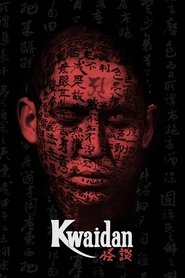[Lafcadio] Hearn’s books […] were calculated to appeal to a Western appetite for the mysteries of “ghostly Japan”; but they were also, it might be supposed, to some degree exotic to a Japanese readership then in the midst of the modernizing Meiji period. That era too, in light of all the cataclysms that followed, had by 1965 acquired its own patina of nostalgic myth. Myth within myth, then, exoticism within exoticism: for Kwaidan, the whole of the past is itself something of a supernatural phenomenon, an unreality to which we yet remain inescapably tied, a ghost story from which no one can entirely awake. […] These are not tales that point to any obvious moral other than the danger of venturing, deliberately or by accident, beyond the invisible barriers that mark the limits of the human world. What lies beyond those barriers is the domain of supernatural terror, but it is also the domain of art.
— Geoffrey O'Brien (Criterion)
The relative points of introduction of these ghosts, however, are negligible, as the entire world as orchestrated by Kobayashi appears under the sway of an otherworldly spell. Characters, if not frozen entirely in their socially demarcated positions, move in slow and deliberate fashion, and the camera’s analogous movement often suggests that of an invisible onlooker, creeping up toward the characters unbeknownst to them or descending from celestial perches.
— Carson Lundh (Slant Magazine)
Synopsis: Taking its title from an archaic Japanese word meaning "ghost story," this anthology adapts four folk tales. A penniless samurai marries for money with tragic results. A man stranded in a blizzard is saved by Yuki the Snow Maiden, but his rescue comes at a cost. Blind musician Hoichi is forced to perform for an audience of ghosts. An author relates the story of a samurai who sees another warrior's reflection in his teacup.

